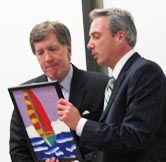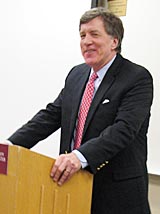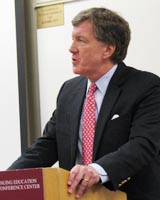US Rep. Jim Ramstad Shares Some Highlights and Challenges of His
18 Years of Service at December 3, 2008 GCDD Meeting
Introduction by Shamus P. O’Meara, Council Chair:
I tried several times to write down what I would say here today about Congressman Jim Ramstad. I began and stopped – sometimes in mid-sentence; always after a few words. I found myself thinking, not about Congressman Jim Ramstad, but about people I know who have disabilities… families who need help… people without friends.
 It then occurred to me – I am really unaware of any leader, or really any person, who possesses such strength and compassion, that when you try thinking of him, you end up thinking of those whom he serves. Those people Jim Ramstad cares about. Those who are his friends.
It then occurred to me – I am really unaware of any leader, or really any person, who possesses such strength and compassion, that when you try thinking of him, you end up thinking of those whom he serves. Those people Jim Ramstad cares about. Those who are his friends.
Our Council has had the privilege of Congressman Ramstad’s leadership and interaction on issues we all care about. I have had the privilege of shaking his hand and talking about families with disabilities. When we asked him to co-author an article highlighting our Council’s digital imaging project, Congressman Ramstad said, “Yes. I want to help.”
When everyone walked away from a fellow Congressman who was dealing with a personal issue of addiction, Jim Ramstad walked toward him, befriended him, and sponsored him.
After Senator Wellstone’s passing, Jim Ramstad worked tirelessly, for years, to bring about real change for people and families with mental health issues. To some, the Paul Wellstone Mental Health and Addiction Equity Act is Congressman Ramstad’s defining moment. To me, it is Jim Ramstad who defines the issues. His legacy is not in awards won, but rather in the lives of people and families he has touched; in lives changed; and lives saved.
Jim Ramstad does not know this, but he has been my mentor. He is a true leader to all in the disabilities community. Congressman Ramstad, on behalf of the Minnesota Governor’s Council on Developmental Disabilities, and, especially, on behalf of families and people with developmental disabilities, including my family, we say, “Thank You.”
Remarks by Representative Jim Ramstad
 I am humbled and grateful to receive this honor from the Governor’s Council on Developmental Disabilities.
I am humbled and grateful to receive this honor from the Governor’s Council on Developmental Disabilities.
I am humbled and grateful to stand in the shadows of all of you who have done so much for people with developmental disabilities.
I am humbled and grateful to be recognized by one of America’s foremost advocacy organizations for people with developmental disabilities.
I am humbled and grateful to work closely over the years with people facing barriers to independence and full participation in life.
As President Kennedy said in his 1961 Inaugural Address, “Here on earth God’s work must truly be our own.”
To my dear friends here today – members of the Governor’s Council, dedicated staff and supporters – you are truly doing God’s work here on earth!
Since 1971, you have brought hope to countless people with disabilities and their families.
Since 1971, you have transformed lives and inspired thousands of people to live up to their fullest potential.
 It’s been my great privilege to work closely with you on state and federal issues affecting people with disabilities. (Mary O’Hara Anderson/Colleen Wieck/Mary Jo Nichols/Mike Ehrlichmann.)
It’s been my great privilege to work closely with you on state and federal issues affecting people with disabilities. (Mary O’Hara Anderson/Colleen Wieck/Mary Jo Nichols/Mike Ehrlichmann.)
I first started working for people with disabilities long before my first election to public office.
The year was 1956 when I was a 10-year-old volunteer on Saturdays for the Anne Carlsen School in my hometown of Jamestown, ND. My grandmother was a close friend of Dr. Carlsen, a remarkable woman born with neither arms nor legs who started this boarding school for students with severe disabilities in grades K-8 from around the country.
I learned a lot more from these young people with disabilities than they ever learned from me.
- Lessons of courage
- Lessons of hope
- Lessons of living up to one’s full potential
In 1980, when I was first elected to the Minnesota Senate, I began working closely with the Governor’s Council on state issues concerning people with disabilities.
In fact, several of your Council members were among the founding members of my Disabilities Advisory Committee.
Together, we worked hard to fund the pilot program that became Metro Mobility.
Together, we worked hard to champion Minnesota’s attendant care program, which gave persons with disabilities the right to in-home care under Medicaid. (Minnesota was the first state to make this program an entitlement.)
Together, we also worked hard to improve access in Minnesota and across the nation.
Moving to the U.S. Congress in 1991, we worked together to pass the “Ticket-to-Work and Work Incentives Act.”
You sent experts (Jeff Bangsberg) to the Ways and Means Committee in Washington to tell Congress that people with disabilities should not lose their Social Security disability insurance and Medicare health benefits if they opt to work outside their homes. As Jeff put it, “This Ticket-to-Work bill is not only the right thing to do; it’s also the cost-effective thing to do.”
Well, it took us 8 more years, but we got this bill signed into law in 1999. As a cosponsor of this landmark law, I’m grateful for your help in passing this major federal law benefiting people with disabilities.
“Ticket to Work” has transformed federal programs into spring-boards into the workforce for people with disabilities. It’s also restored dignity and independent living to hundreds of thousands of people.
We’ve also worked together to improve Rehabilitation Services, knock down employment barriers and beef up vocational rehabilitation programs, such as the Developmental Disabilities Assistance and Bill of Rights Act of 2000
It’s also been a great privilege to co-chair the Bipartisan Disabilities Caucus with my colleague and good friend, Jim Langevin of Rhode Island.
Our caucus has held hearings and promoted legislation on the IDEA, Medicaid funding, stem cell research, Medicare catheters, in-home restrictions on mobility devices and mental health and addiction treatment parity, to name a few.
On all these critical matters for people with disabilities, the Minnesota Governor’s Council on Developmental Disabilities’ has always been there. Your great leaders have provided critical support at the State Capitol and in Washington.
Thanks to you and others, the Council has been a strong legislative force to improve the lives of people with disabilities.
Your inspiring and visionary leadership has empowered thousands of people with disabilities to enjoy the dignity of independent living – and that’s what the Governor’s Council is all about! That’s what America is all about!
On behalf of the people of Minnesota who proudly support people with developmental disabilities and your critical mission, I thank all of you – for all you have done.
- You have listened to the voices of people with disabilities.
- And you have become a national model of how to do things right!
I want to close by telling you that, in large part, working with and for people with developmental disabilities has made my job worthwhile.
Working to provide better opportunities for friends like you keeps me going when the going gets tough in Washington.
As that great Minnesotan, Hubert H. Humphrey once said, “The moral test of our nation is how we treat those who are in the dawn of life, the children; those who are in the twilight of life, the elderly; and those who are in the shadows of life, the sick, the needy and the disabled.”
I thank God for the Minnesota Governor’s Council on Developmental Disabilities which has passed this moral test with flying colors.



